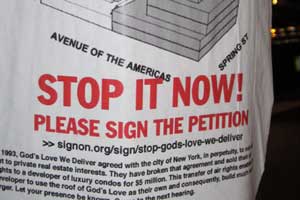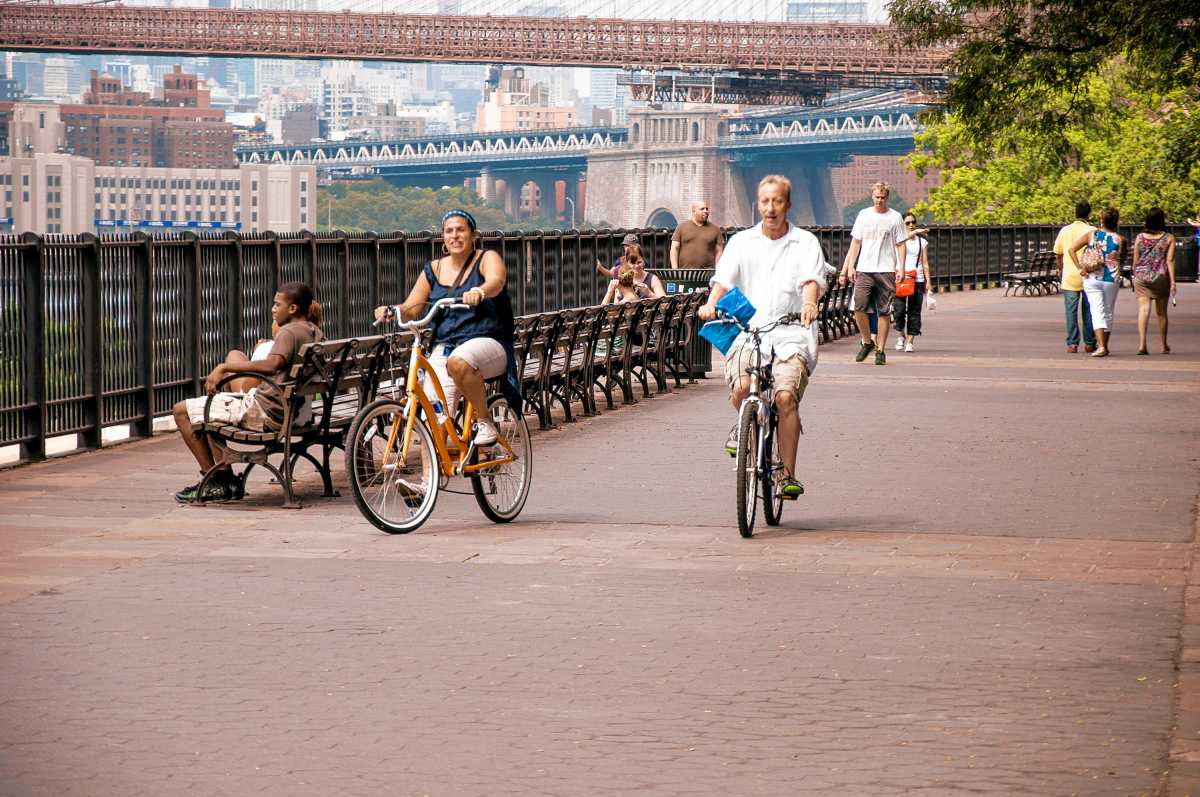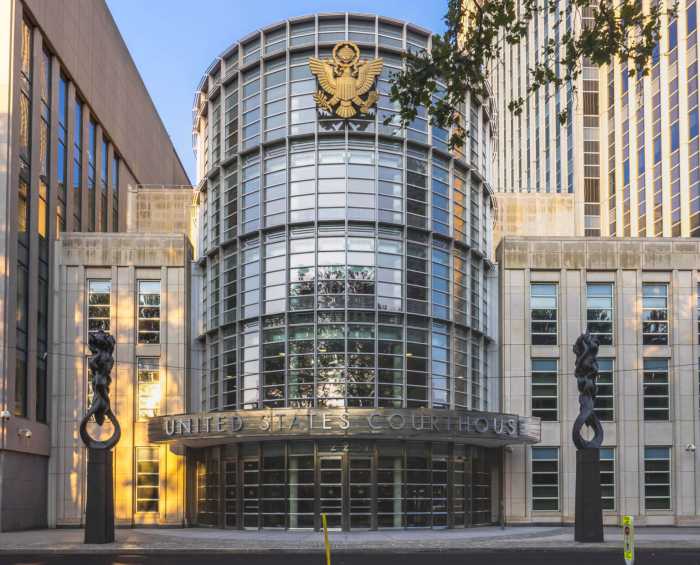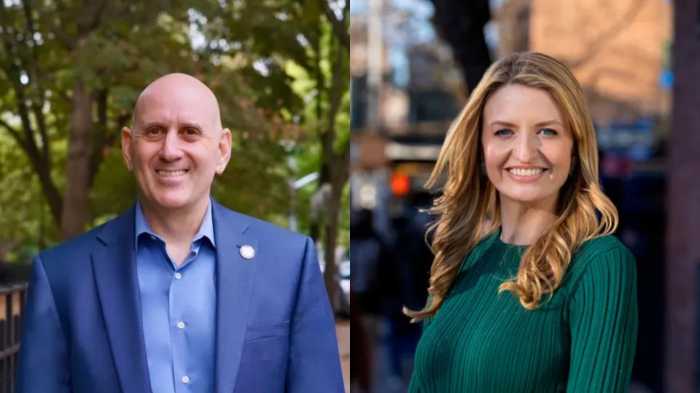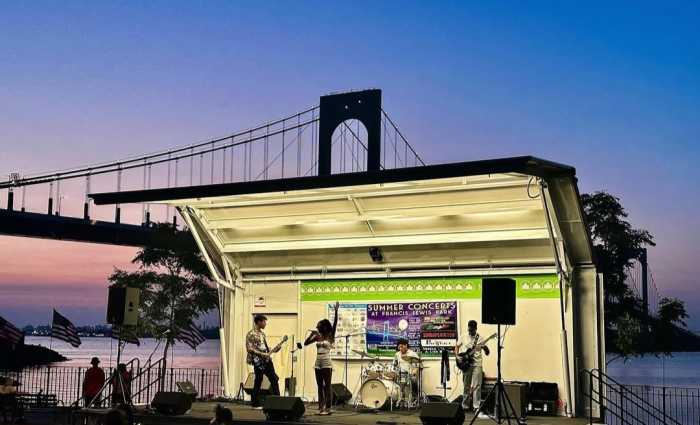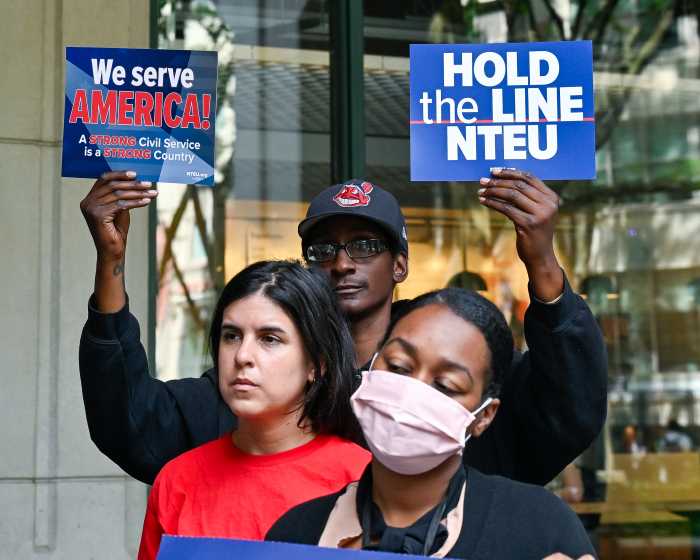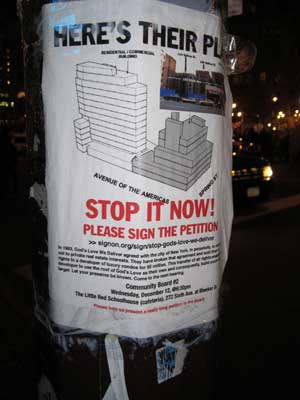
BY LINCOLN ANDERSON | The recent approval by Community Board 2 of a “minor modification” to allow God’s Love We Deliver to transfer air rights to an adjacent residential project has left Soho neighbors furious and saying they were deceived. At least 50 of them have filed a petition demanding a rehearing and a new vote on the issue.
Everyone on all sides of the debate basically supports God’s Love We Deliver and its mission: to cook nutritious meals and deliver them to sick individuals living at home who in some cases are too ill even to cook for themselves.
G.L.W.D. started 26 years ago at the height of the AIDS crisis, providing meals for people suffering from H.I.V./AIDS. Today it provides 1.1 million meals a year to people living H.I.V./AIDS, cancer and nearly 200 other illnesses.
The group purchased its building at Sixth Ave. and Spring St. from the city at auction for $535,000 in 1993. Originally an M.T.A. garage, the structure had most recently been a library for the blind and was vacant before G.L.W.D. took it over.
Now, because the organization has outgrown its Soho headquarters, and because it famously has “no waiting list,” it plans a vertical addition to increase its building’s size.
But the question of whether God’s Love should be allowed to transfer its air rights to an adjacent project, at 180 Sixth Ave., has pit the community board against the community. The G.L.W.D. property contains a deed restriction for community-facility use. Opponents of the air-rights transfer question how development rights for community-facility use can be sold off to help increase the bulk of a market-rate residential development. In turn, for the residential project to meet its open-space requirement, under the “minor modification,” its residents would be able to access the new G.L.W.D.’s building’s rooftop — which would be planted as a garden for herbs and vegetables for use in the organization’s prepared meals.
The building that G.L.W.D. plans would be 41,000 square feet. G.L.W.D. could, however, develop up to 66,000 square feet on its own property, but instead plans to sell 19,000 square feet of air rights to the adjacent development project.
Either way, with or without the added air rights, the residential building would be 14 stories tall. But with the air-rights transfer it would extend about 30 feet farther southward. G.L.W.D. would reap about $6 million from the deal, helping it ensure the financing of its own $22 million expansion project, which would result in a five-story building.
What has infuriated community members living near the adjacent project sites, however — particularly residents along Sullivan St. — is the fact that C.B. 2’s Land Use Committee at its Dec. 12 meeting voted nearly unanimously to deny the application for the minor modification; but then, over the course of the following week, reversed itself and wrote a new resolution approving the application, which was subsequently approved by the full board of C.B. 2 at its full board meeting last month, as residents in the audience looked on in disbelief.
Adding to residents’ anger was the fact that the committee’s resolution was changed after its chairperson, Tobi Bergman, and the C.B. 2 chairperson, David Gruber, held a subsequent private meeting with representatives of G.L.W.D. and QT, the developer of the adjacent residential project. Bergman and Gruber were able to get some concessions from QT, but these were paltry in the eyes of neighbors, who said they certainly didn’t justify the committee’s about-face on its resolution. The concessions amounted to QT paying for air conditioners and double-pane windows for the building on Sixth Ave. directly to the north, up against which the QT building will legally abut. QT doesn’t want to shift its building further to the south on the currently vacant lot because the lot is widest at its northern end and becomes too narrow toward its southern end for development purposes.
Initially, the the Land Use Committee stated that it was recommending denial of the G.L.W.D. application because, “While C.B. 2 is proud to be home of this important life-sustaining group, the applicants failed to recognize and respond to important concerns from neighbors.”
In its subsequent substitute resolution recommending approval, the committee wrote, “C.B. 2 recommends approval if the agreements contained herein [air conditioners, double-pane windows, etc.] are complied with, but notes that modification of a use restriction is an extraordinary measure warranted in this instance only by the specifics of the affected organization and underlying conditions.”
Also adding to the push for the minor modification to allow the G.L.W.D. project to go forward was retiring state Senator Tom Duane, who was making his last appearance before C.B. 2 before leaving the Senate. He noted that in his 21 years as an elected official representing the community, he had rarely weighed in on and issue before C.B. 2 voted on it. This, however, was one of the rare exceptions.
“I use my goodbye time to talk about something that is very close to my heart,” Duane told the board members. He began by recalling the early days of the AIDS crisis when people “were literally wasting away.”
“The fix is in!” yelled out one of the opponents in the audience.
Speaking of the restrictive declaration on the G.L.W.D. site, which was put in place before the city sold the property off, Duane said, “We enshrined that restriction — that it would be for social services — in law. It was hard work, and I carried it to the City Council and it got passed. And today aren’t we the same community? This will make it possible that G.L.W.D. will continue its mission of never saying no to its clients. Without that access [to G.L.W.D.’s roof by the new residential project] the air rights have no value and G.L.W.D. cannot improve its facilities,” Duane explained.
He added that the extra bulk the QT project would gain thanks to the additional air rights would be “less dramatic than it might seem. Yes, a more bulky building,” he conceded, “but it would leverage the sale of air rights to help G.L.W.D. fulfill its mission.”
“We saved that building from being sold to the highest possible bidder,” he recalled of when he was in the City Council and fought to include the deed restriction. “We said, ‘No, we want social services there.’ That’s the gift of Community Board 2.”
Duane added that he is a strong supporter of creating a full South Village Historic District as advocated by the Greenwich Village Society for Historic Preservation.
“I would lie down in the street against oversized, noncontextual development,” he declared.
However, speaking before the full board voted on the substitute resolution, Micki McGee, a Sullivan St. neighbor of G.L.W.D. and the QT site, was beside herself at the committee’s 180-degree reversal.
“Last week I saw a Land Use Committee that stood up to arrogance,” she said. “Here we see a substitute resolution that no member of the public has seen. I am heartbroken, because we are going to have to move, and if we don’t move, we’ll have a constant project next to us for years.” McGee later added, “They’re trying to get this through before the historic district happens.”
Added David Chester, another neighbor, “The reason I moved to Soho 15 years ago was because of the low-rise, low-density nature of the neighborhood — and the Trump Soho was built and damaged the neighborhood, and now it’s coming to us.
“You represent us,” he scolded the C.B. 2 members, “and don’t you forget that.”
Several C.B. 2 members did speak out against the substitute resolution they were being asked to vote on.
Said Maury Schott, “I can’t help noting the irony that 18 years after a huge battle to keep this site from being given to a luxury developer, now G.L.W.D. is trying to use its goodwill to leverage and benefit a luxury project.” He added, “We all know that institutions by their very nature want to expand.”
Said Sean Sweeney, “We’re a nation of laws and none of us are above the law. You and I have to obey the law — and the zoning laws. We can’t abrogate the law because it’s a nice organization.”
The 1993 restrictive declaration on the G.L.W.D. site actually allows only certain types of community-facility use — not education, for example. Sweeney noted that was because the community specifically wanted to block N.Y.U. from ever getting control of the site.
But Bergman said while they would have liked to have gotten more concessions from QT and G.L.W.D., they did get some things. QT also agreed to add “attractive landscaping” on the roofs in its rear yard.
“We’re not delighted,” Bergman said, “but they did come a good distance.”
At the same time, he said dubiously of the air-rights transfer, “I think there’s a clear argument that something illegal is going on here — but the Department of City Planning has stated to us that it’s ‘as of right,’ ” meaning legal.
In fact, the Bloomberg administration is solidly behind the application. Representatives of the city’s Department of Citywide Administrative Services and City Planning attended the Land Use Committee’s December meeting.
In the end, the board voted 22 to 14 to approve the minor modification to allow the QT project residents access to the G.L.W.D.’s rooftop.
In a statement after C.B. 2’s vote, Karen Pearl, president and C.E.O. of G.L.W.D., said, “We are grateful that after careful consideration Community Board 2 voted to support our expansion plans. We look forward to the conclusion of the review process later this month as the project moves to the City Planning Commission for consideration.”
Meanwhile, unhappy with how the Land Use Committee reversed its resolution without first cluing in the community — and questioning if Bergman and Gruber’s private powwow with the applicants violated the Open Meetings Law — about 50 local residents, mostly on Sullivan St., have signed onto a petition demanding that C.B. 2 rehear the whole matter.
“We believe,” the petition states, “that in order to maintain the trust of the neighborhood in the community board, and the legitimacy of its procedures, it is important to avoid even the appearance of impropriety that emerged from the hasty reversal of the Land Use Committee’s Dec. 12 decision to recommend denial of the G.L.W.D. request.”
Both Bergman and Gruber said their private meeting with G.L.W.D. and QT did not violate the Open Meetings Law.
“Meetings must be public when an action can be taken, that is, when there is a committee or board quorum,” Bergman said.
Speaking to The Villager following the full board’s vote, Bergman said, “I will say I feel the project is a significant project. Right now, we have a vacant lot and a nonprofit that is struggling. They are in a position where they need to expand to continue to do what they do,” he said of G.L.W.D. “There was no way to reduce the impact of the project. And the impact of the project is overblown — this is New York.”
He said he had hoped the changes that they got from QT had happened between the Land Use Committee’s November and December meetings, but unfortunately it didn’t happen that way.
Asked if he’d been pressured by the city or elected officials to change the committee’s resolution, Bergman said no.
Similarly, Gruber said he and Bergman didn’t violate any rules by meeting with G.L.W.D. and QT. He said Bergman’s only “mistake” was to have written up the substitute resolution before the full board meeting, since substitute resolutions usually “come from the floor,” proposed at the full board meeting by fellow board members. However, board members have previously arrived at C.B. 2 full board meetings with substitute resolutions already written out that were subsequently approved by the board: Shirley Secunda did this a few years ago with a resolution on the Washington Square Park renovation, overturning a Parks Committee resolution that opposed the project.
“I think it was the best we could do,” Gruber said of the board’s final resolution on the G.L.W.D. issue. Though, he added, “I was upset that we couldn’t wrangle more concessions.”
Some opponents were outraged that Duane had been allowed to speak on G.L.W.D.’s behalf at the meeting.
However, Gruber said, “Can I really tell a state senator, ‘You can’t come to your last community board meeting before you retire?’ That would have been a little bizarre.”
As for C.B. 2 rehearing the matter, he said, “I don’t think that’s going to happen. The reso is passed, it’s on its way to the Planning Commission.”
As for whether the private meeting by Bergman and Gruber with the applicants violated the Open Meetings Law, Audrey Gelman, a spokesperson for Borough President Scott Stringer, who appoints and oversees the boards, sent the following response:
“Based on consultation with the New York City Law Department and the New York State Committee on Open Government, Open Meetings Law requires that members of the public be allowed to attend meetings of public bodies that consist of at least a quorum of its members; and where a quorum is not present, the Open Meetings Law does not require a meeting to be open to the public. Upon such consultation, neither agency determined that there was a violation of Open Meetings Law.”
One C.B. 2 member, requesting anonymity, suggested a bit cynically that the board could have avoided all the the hoopla by just voting to deny the application in its advisory opinion, since City Planning, in the end, would likely just approve it anyway.
“Keep the farmers happy,” he said.



